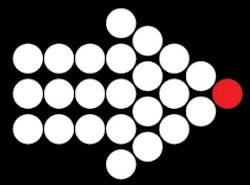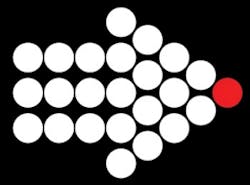When passion isn’t enough
Call the coach for help with career strategy
By Sandra Johnson, RDH
The profession of dental hygiene is one that requires the physical ability to maneuver your body like a Cirque du Soleil acrobat and the mental agility to recall specific pathogenic bacterium and treatment modalities at the drop of a hat. Yet, with this monumental task before us, we’re up for the challenge.
Whether you’re a new graduate or a seasoned dental hygienist, whether dental hygiene was always your career choice or you happened into it, whether you work in a clinical, educational, or administrative setting, the passion that dental hygienists have about their profession is like no other. I happened into the dental hygiene program after eight years of working as a dental assistant. Dental hygiene was the next logical step to “make more money,” but within two weeks of my dental hygiene education, I was hooked.
Once I realized that I, as a dental hygiene student, had the ability to assess patients, identify oral diseases, recognize systemic influences within the body, and help patients make choices that would affect their health, there was no looking back. I remember thinking how awesome this was, and wondering why everyone wasn’t a dental hygienist. When I graduated, my transition was relatively easy because I was hired by the office where I had been working as a dental assistant, and I was immediately able to start eradicating the world of Porphyromonas gingivalis (Pg) and Actinobacillus actinomycetemcomitans (Aa). Life was good.
About two months into my clinical career, the unthinkable happened — my hand started to hurt. Since I was diligent with my ergonomics, I was certain that this would pass and justified the pain to the fact that I was seeing more than one patient per day. As months passed and the pain continued, I realized that my clinical hygiene career might be short lived and I was devastated. I continued to practice clinically for 10 years and suffered with the pain in my right hand. I was ultimately diagnosed with focal dystonia, and I completed rounds of massage therapy, acupuncture, and cortisone injections until I finally accepted the fact that regardless of how much I love clinical dental hygiene, my career was over.
Now what? I felt like I was in the land of misfit toys — all I knew and loved was dental hygiene, but who wanted a dental hygienist who couldn’t “clean teeth”? I knew there were other opportunities for dental hygienists outside of the clinical setting, but where were they and how did I find that opportunity? I reached out to several manufacturers thinking that I would sell toothbrushes or toothpaste. Really, what company wouldn’t want a dental hygienist supporting their oral health products? I thought I would be a shoo-in, but I found out that sales companies wanted sales experience. So the obvious question became, “How do I get sales experience if no one will hire me?” And then the panic sets in.
I was fortunate to find employment in a leadership role with a group practice, and I quickly realized how incompetent I was when it came to anything other than the art and science of dental hygiene. Under the mentorship of an awesome coach, I learned communication strategies to overcome obstacles in both the clinical and administrative settings, and I learned some necessary business skills (how to read a profit and loss statement, create a financially successful hygiene program, minimize staff turnover, create marketing initiatives, and more) that enabled me to obtain my current position. I transformed from a clinician to a businessperson with clinical skills.
I know. It sounds like I caved into “the man,” but in all actuality, how many of us want to break out of the boundaries associated with dental hygiene and use our brains to influence others in nontraditional settings? How many of us worry because our backs hurt, our hands hurt, or our necks hurt, but we suffer through the pain because we don’t know what else to do, or we can’t sacrifice the revenue we generate for our households? The beauty is that we don’t have to sacrifice our clinical brains because we have business brains and, in fact, clinicians skilled in business principles are like gold in the dental industry because very few people possess both competencies. I believe it is easier to teach a dental professional business skills than it is to equip a businessperson with the passion, heart, and science necessary to ensure that patients receive the best care that dentistry has to offer.
In my current role as the director of dental hygiene support for a management company that provides support services for general and multispecialty affiliated dental practices, I am blessed to be able to couple my clinical roots with my business strengths. In this role, I support professional corporation (PC) owners (as you know, in most states only doctors can own dental practices) by advocating on their behalf to ensure that quality dental care is provided to their patients. This requires that I assist the chief dental officer and clinicians to research and evaluate products and processes, identify opportunities for enhanced clinical care within affiliated dental practices, facilitate ongoing training to implement necessary changes, and ensure that patient advocacy remains the driving force for the dental hygiene practice.
In addition, I’m fortunate to stay connected to the practice of dental hygiene by continuing to interact with dental hygienists on a daily basis. The voice of every dental hygienist is heard and valued and each one of them plays an important role in the development of the hygiene program in their offices and in their affiliated dental groups. Based on their feedback, recommendations from clinicians, and the direction of the PC owners, I assist the training department to provide robust continuing educational tools, ensure that each new hygiene employee is effectively trained to minimize the discomfort of the first day, and monitor industry trends to ensure that the efforts of the hygienists are recognized and appropriately compensated. Most importantly, it is exciting to watch the preventive and restorative relationship between the doctor and hygienist grow into a beautiful marriage that is built on mutual respect and comprehensive care.
My story evolved from a physical limitation, but many hygienists suffer from burnout due to the demands of time constraints, insurance limitations, limited scope of practice, poor working environment, not feeling valued as a professional, unhappy patients, poor doctor/hygienist relationship, and the list goes on.
There is so much more out there if each hygienist would take the chance to explore new opportunities. But how do you find these great opportunities, and how do you learn the skills necessary to make you competitive in a nontraditional setting? You have to step out of your comfort zone, determine (even vaguely) what you would like to do, and then partner with someone who has the skills you want to learn. There are several life, professional, leadership, and career coaches available that can assist you in gaining focus for your personal, professional, and financial life, but it takes the commitment and investment in yourself to explore the opportunities. How badly do you want a change?
As a certified life-purpose, career coach, I’ve had the great blessing to see individuals reach goals that they never believed possible. Coaches have the privilege and responsibility of empowering, mentoring, motivating, and encouraging their clients to identify goals and objectives, and develop action plans that will enable them to take the necessary steps to achieve their objectives. Progress is measured as the goals are achieved.
Career coaching can be in a group setting or individualized; it can be a 45-minute coaching call or a 15-minute laser call to overcome a specific obstacle; it can be structured or on an as-needed basis; it can be verbal or via email. In other words, it can be whatever you want it to be, and packages are designed to meet each person’s individual needs. The investment of hiring a career coach can range from $60 for a 45-minute session, to $2,000 for a full-day corporate training. Most coaches have an introductory package, a mid-range package, or silver, gold, and platinum packages available to customize what clients want. In addition, sessions may be purchased in advance — three, six, nine and 12-month packages may be available so you can strategically plan your career path and save money. Most coaching is done by telephone and oftentimes the coach lives in a different state or time zone, so coordination of schedules may be tricky, but coaches are usually flexible and provide a variety of dates and times to accommodate a client’s schedule.
One of the most important elements of partnering with a professional coach is developing a vision statement. Unlike a mission statement, a vision statement allows you to visualize what you see for yourself and where you want to be. A coach will help you identify obstacles and will partner with you to transform your dreams into actionable items, but the results are truly in each person’s hands.
Are you ready for a change? Are you interested in exploring opportunities that you may or may not know existed? Are you willing to take a chance and invest in your future? Are concerns over the longevity of your career keeping you up at night? If you answered yes to any of these questions, then a professional coach may be able to assist you.
Most coaches provide a free initial consultation, so there is nothing to lose but 30 to 60 minutes of your time, but the seeds sown may provide you with a life of abundance that you never dreamed possible. There is nothing to lose, and there are many coaches available, so take a chance, identify the right coach for you, and schedule your free coaching session to begin a journey of discovery, excitement, and endless possibilities.
The one thing that I can promise you with 100% certainty is that you won’t be able to achieve anything if you never start anything. If you continue to do the same things today that you have always done, then you will continue to achieve the same results. Do you want more? If you answered yes, then reach for the “golden ring,” but first you need to let go of the brass ring (insecurities, disbelief, fear).
I recently attended CareerFusion in Daytona Beach, and we participated in an exercise I’ll never forget. All the participants were asked to choose two rocks — one represented our strengths and the other our weaknesses. We then progressed as a group to the beach where we cast our weaknesses (rocks) into the ocean to never be seen again. The only rock left was our strength. Invest in yourself. What have you got to lose?
Sandra Johnson, RDH, is a licensed dental hygienist who is passionate about advancing the profession of dental hygiene through empowerment, motivation, and skill development. Sandra is the national director of dental hygiene support for Smile Brands, which is a practice management group of support services for over 350 affiliated dental practices. In addition to this role, Sandra is a certified professional coach dedicated to helping dental providers meet their personal, professional, and financial goals by honing their leadership, management, and business skills.
Past RDH Issues

